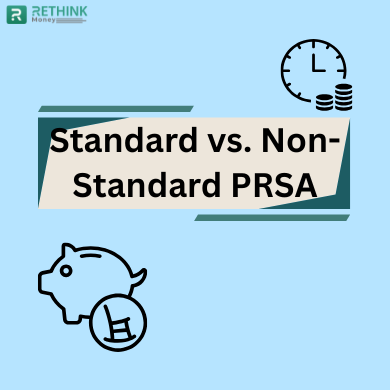This is a key distinction in the Irish pension landscape, especially as PRSAs are now becoming more central with the IORP II changes.
PRSA = Personal Retirement Savings Account
It’s a contract-based, personal pension product. Tax-efficient, flexible and portable. There are two types: Standard PRSA and Non-Standard PRSA.
Standard PRSA
Charges are capped by law:
- Annual Management Charge (AMC) capped at 1% per year of assets.
- No contribution charges (or capped very low).
Investment options are limited
- Can only invest in funds that comply with certain regulatory criteria (broad, diversified, not too exotic).
- Basically, funds that are “readily realisable” — i.e., not illiquid assets like private equity or property syndicates.
Simple, transparent, mass-market.
Best for:
- Most employees, self-employed, or anyone looking for an accessible, low-cost, straightforward pension.
- People who don’t want to worry about complexity.
- Employers offering pensions to employees in a compliant way — if they don’t provide an occupational pension, they must offer at least access to a Standard PRSA.
Non-Standard PRSA
No charge caps.
- The provider can set whatever charges they want — typically higher than Standard.
Wider investment choices.
- Access to a much broader range of investments, including property funds, private equity, structured products, etc.
- Potentially higher risk/return strategies.
Best for:
- More sophisticated investors.
- People who want access to specialist investments.
- Often used by wealthier individuals with advisers, or those managing larger pension pots and looking for more control and tailored strategies.
When to use which?
- If you’re an employer, you need to give staff access to a Standard PRSA if you don’t have an occupational scheme.
- If you’re starting out or want simplicity, the Standard is almost always the go-to.
- If you’re looking to diversify, or you’ve maxed out simpler strategies and want bespoke investment choices (and accept higher costs), Non-Standard could make sense — but typically with professional advice.
Here are some provider examples
| Provider | Standard PRSA | Non-Standard PRSA | Notes |
| Zurich Life | Zurich PRSA — capped charges, simple fund range (e.g. Balanced, Dynamic, Indexed funds) | Available — wider fund range, including property and specialist funds | Very popular for Standard PRSAs, strong performance in default funds. |
| Aviva | Aviva PRSA — clear, accessible options | Broader investment menu, can include multi-asset or alternative funds | Aviva has ramped up PRSA offering post-2023 reforms. |
| Irish Life | Irish Life Empower Standard PRSA | More flexible non-standard offerings via brokers | Irish Life has deep employer penetration, good digital tools. |
| New Ireland | Standard PRSA available | Wide access via brokers, with specialist advice | Traditionally strong in broker market. |
Here is a comparison of PRSAs vs. Occupational Pensions
| Feature | PRSA | Occupational Pension (OP) |
| Setup | Individual contract | Employer-trust based |
| Portability | Fully portable | Depends, can be transferred |
| Employer contribution | Optional | Often mandatory or common |
| Investment control | Depends (Standard = limited) | Chosen by trustees, employee often has choices |
| Costs | Transparent, capped (Standard PRSA) | Varies, sometimes hidden costs |
| Auto-enrolment impact | Exists alongside auto-enrolment | Will interact (but AE will be separate) |
| Governance | Regulated by Central Bank and Pensions Authority | Trustee-based oversight |
Auto-Enrolment Coming (2025/2026 expected)
Ireland is finally moving to Auto-Enrolment, expected to start in late 2025 or early 2026.
- Mandatory participation for eligible workers (unless they opt out).
- Contributions from employee, employer, and state top-up.
- Managed by the State-sponsored Central Processing Authority — providers will be selected via tender.
Impact on PRSAs:
- PRSAs will continue for self-employed, high earners, and those wanting to go beyond AE limits.
- AE will increase overall retirement savings but won’t replace PRSAs.
- Employers will still need to offer access to a Standard PRSA until AE becomes fully mandatory.
Pros and Cons of PRSAs
Pros:
- Portability — great for mobile workers or self-employed.
- Tax relief still excellent (up to 40% for higher earners).
- Transparent fees (Standard PRSA).
- No need for employer/trustee structures.
Cons:
- Standard PRSA investment options a bit “plain vanilla”.
- Charges can be higher on Non-Standard PRSAs.
- No guaranteed employer contributions (unlike many occupational schemes).
The trend in Ireland is generally toward Standard PRSAs, especially as they get cleaner, cheaper, and simpler, especially post-2022 reforms. Non-Standard is really more of a niche or advanced solution.
For most everyday retirement savers, a Standard PRSA will do the job well.




